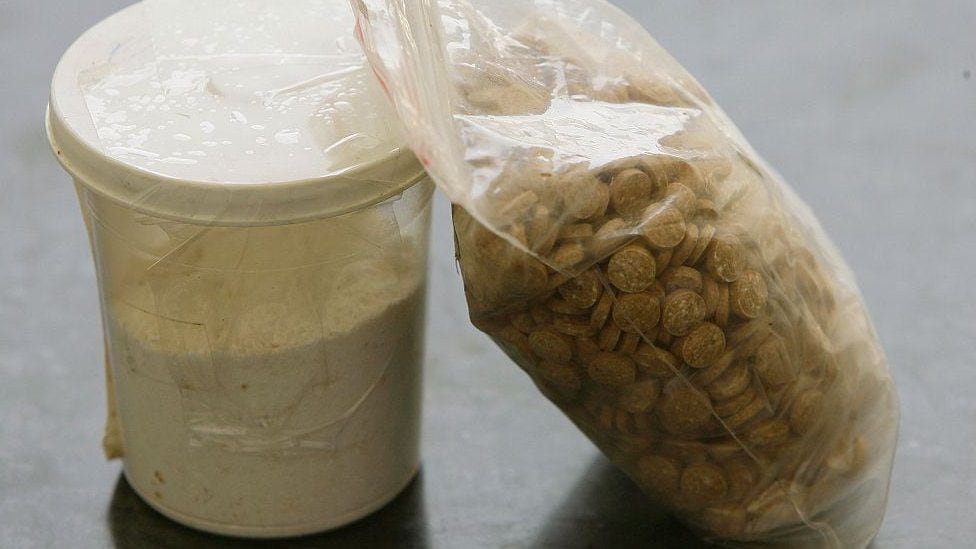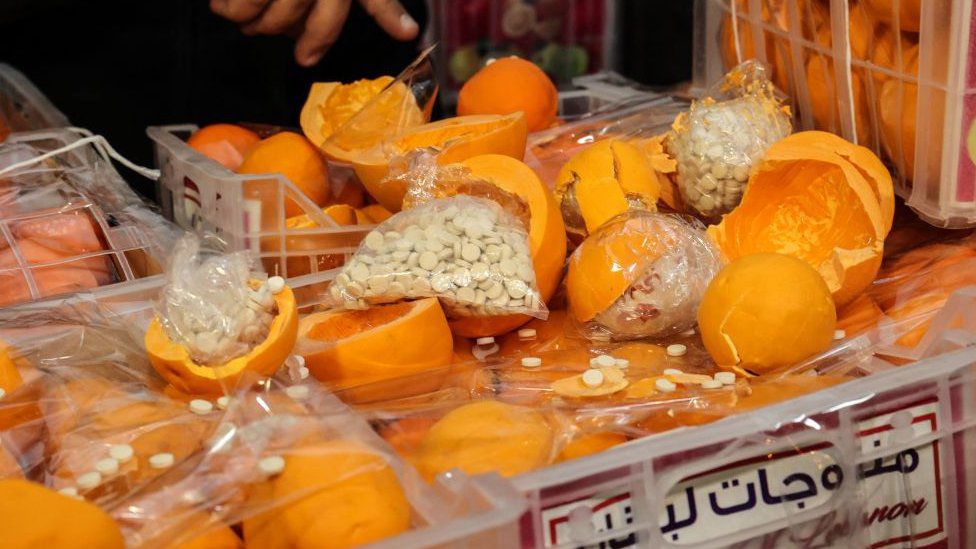An old drug is back in the Arab world: captagon.
For years, it was used as a prescription antidepressant in the West, although it was later banned when its high addictive potential was demonstrated.
LOOK: The survivor of a bombing in Ukraine who was “turned” into fake news by Russia
Until not long ago, it was denounced that its production was one of the sources of income for the self-styled Islamic State, for which it was even called the “drug of terrorists.”
Now, investigations ensure that its large-scale production and distribution in the Persian Gulf and the Levant is a state issue.
“Our study showed that captagon has become the main source of income for the Syrian government,” he tells BBC Mundo Caroline Roseresearcher at Newlines Institute for Policy and Strategyan thinktank based in Washington that recently published an exhaustive investigation into the production of the drug in Syria.
“Everything suggests that people close to (Syrian President) Bashar Al-Assad, including his younger brother Maher al-Assad, who is the commander of the army’s Fourth Armored Division (an elite unit), are behind this business. which has become Syria’s main export,” he adds.
The Syrian government has repeatedly denied being involved in the production of captagon and claims that the numerous reports and studies that point to it are false.
“Syria plays an important role in supporting the international community’s efforts to combat crime in general, especially the fight against drug trafficking,” the country’s Interior Ministry wrote on Facebook last December.
The statement said that “Syria continues to play an important role in supporting the international community to combat crime in general and drugs in particular.”
Syrian Interior Minister Muhammad al-Rahmoun told state media Athrpress in October 2021 that “Syria is a drug-free country” but that its geographical location “makes it a transit country”.
However, the study by the Newlines Institute for Policy and Strategy is not the only one that has pointed the finger at the Syrian government.
Coast guard reports from several countries, including Italy and Jordan, and investigations by The New York Times and The Guardian, the Organized Crime and Corruption Reporting Project (OCCR), and the Center for Operational Analysis and Research (COAR) also point to towards Damascus.
“The lack of conventional economic activities has increased the relative attractiveness of industrial-scale drug speculation, which has been largely captured and controlled by drug businessmen linked to the regime of Syrian President Bashar al-Assad and the regime’s foreign allies,” indicated the COAR last year.
With the Syrian economy in tatters after a decade of war and unable to recover from international sanctions, captagon has become a multibillion-dollar industry, according to research.
“The areas where captagon production is most pronounced are those controlled by the al-Assad regime and his close relatives,” says COAR analyst Ian Larson.
“It’s a circumstantial connection, but indicative.”
LOOK: Firearms were the leading cause of death for children and adolescents in the US in 2020
The earnings
According to research by the Newlines Institute, in 2021 alone the illegal captagon market produced profits valued at US$5.7 billion.
“We can’t be certain how much of this money is going into the hands of the Syrian government, but arguably a significant portion of this revenue is probably going into the pockets of these people,” Rose says.
The researcher assures that after the war of more than 10 years and the sanctions against the Syrian economy, the captagon has become “an alternative income stream for the State”, but also for non-state actors.
“Many businessmen and members of the Syrian agricultural and development sector also appear to be involved, which is an alternative form of profit for an economy that is devastated,” it says.
From medication to banned drug
Captagon was first synthesized in the 1960s and used throughout the world as an antidepressant that was also prescribed for other conditions such as attention deficit disorder and narcolepsy.
“It went from being a prescription drug, to being banned, to being a widespread illicit substance in the Middle East. It has now become one of the most defining and dominant illicit trades in that region, particularly in the Middle East. Levant and the Persian Gulf,” explains Rose.
According to the researcher, its popularity in that area of the world is due to the fact that its effects are not as negative as those of other drugs, but mainly due to two elements that range from politics to the characteristics of society or the economy:
This has led to the substance also being known as “poor man’s cocaine”.
And it is that the captagon causes the person who consumes it to feel productive. In addition, it suppresses hunger and sleep and gives a boost of energy, which has made it popular among young people as a recreational drug.
“You have to keep in mind that captagon has also evolved from its formula, based on amphetamine, to include higher doses of amphetamine and on many occasions other harmful agents are also added, such as copper, zinc, quinine, pseudoephedrine and other substances. “explains the researcher.

The studies that led to its ban also showed that it could become an addictive substance, and some research suggested that it could also lead to violent behavior, high blood pressure, and cardiovascular problems.
“Captagon has multiple uses, so it’s become a very interesting and fascinating substance that has multiple different user profiles,” says Rose.
the syrian market
Although captagon was consumed in the Arab world long before the arrival of the Islamic State or the war in Syria, its production in recent years has reached record levels.
An investigation of the end of 2021 of the American newspaper New York Times It showed that more than 250 million captagon pills had been seized worldwide that year, an amount 18 times greater than that seized four years ago.
According to Rose, statistics so far in 2022 suggest captagon traffic will be even higher.
“There is a large production of the drug, which involves not only the Syrian government, but also landowners, ranchers and businessmen from the Arab world who respond to the demand of a growing market,” the expert says.
“But logically, doing this by individual or small group methods is not the same as when you are a State and put part of your forces at the service of the production and distribution of this substance, which basically puts it at an industrial level” , he adds.
Rose assures that his research, which he carried out together with analyst Alexander Söderholm, showed that in recent years the ways in which the al-Assad government and the Syrian army have become involved in the production and distribution of captagon have become more sophisticated.
The Newline Institute report indicates that the Syrian government has been involved in this business from the production to the distribution of the substance.
“We found that there are numerous places where it is produced that are associated with the Syrian army, but the Syrian authorities have also facilitated the production of captagon with small, medium and sometimes large-scale laboratories and factories,” he says.
“And then of course with the transportation of these drugs to key state-owned ports or sometimes unofficial ports along the Syrian coast or the Lebanese coast and along border points. It’s such a network. complex and so dynamic that make Syria probably the most modern of the narco-states, at least for the time in which it has been consolidated as such”, he comments.
A shipment of captagon valued at $100 million was seized at a Greek port in 2020.
The ship had started its journey in the Syrian port of Latakia, under the control of the Syrian government, and the drug was hidden under coffee, spices and sawdust. An investigation by the OCCRP (Organized Crime and Corruption Reporting Project) indicated that the ship’s owner was Taher Al-Kayali, a man sanctioned by the Italian authorities and allegedly related to Mudar al-Assad, a cousin of the Syrian president.
The Syrian Ministry of the Interior, for its part, has stated that “they are making maximum efforts to confront drug traffickers and promoters, and to confront and repress this phenomenon by persecuting drug smuggling and trafficking networks and seizing narcotic substances.”
A new source of income
The Newsline Institute report points out that the drug has been a hole through which to obtain money in the great wall of sanctions that Syria is experiencing as a result of the war of more than 10 years.
“The Syrian regime has found in the captagon a loophole to counteract and undermine the effects of these sanctions and of the crisis, but substantiate those that affect individual members of the government, their affiliates and their allies,” it says.

Given that captagon has become a very profitable and very popular substance in both the Levant and the Persian Gulf and with the ability to reach new target markets, the research indicates that it is likely that even the end of the war in Syria will not end its large-scale production.
At least not while al-Assad and his family remain in power.
“We project that this trade will continue to expand over time. Of course, this presents not only a challenge for law enforcement at the regional level, but also a challenge for human security, since many people will continue to consume this drug without regulation or supervision, and even more so when we have seen that its formula is being altered,” notes Rose.
Source: Elcomercio

:quality(75)/cloudfront-us-east-1.images.arcpublishing.com/elcomercio/GIYDANRNGA2C2MRXKQYDAORSGA.jpg)

:quality(75)/cloudfront-us-east-1.images.arcpublishing.com/elcomercio/RHGH5XKW25DG5I6EKYTZSIX4L4.jpg)
:quality(75)/cloudfront-us-east-1.images.arcpublishing.com/elcomercio/TAFVT7GIJNDSXDG7Y4CNFZBYCI.jpg)

:quality(75)/cloudfront-us-east-1.images.arcpublishing.com/elcomercio/LBQXXFJIKJAI5OQZYZR2QDFEKE.jpg)
